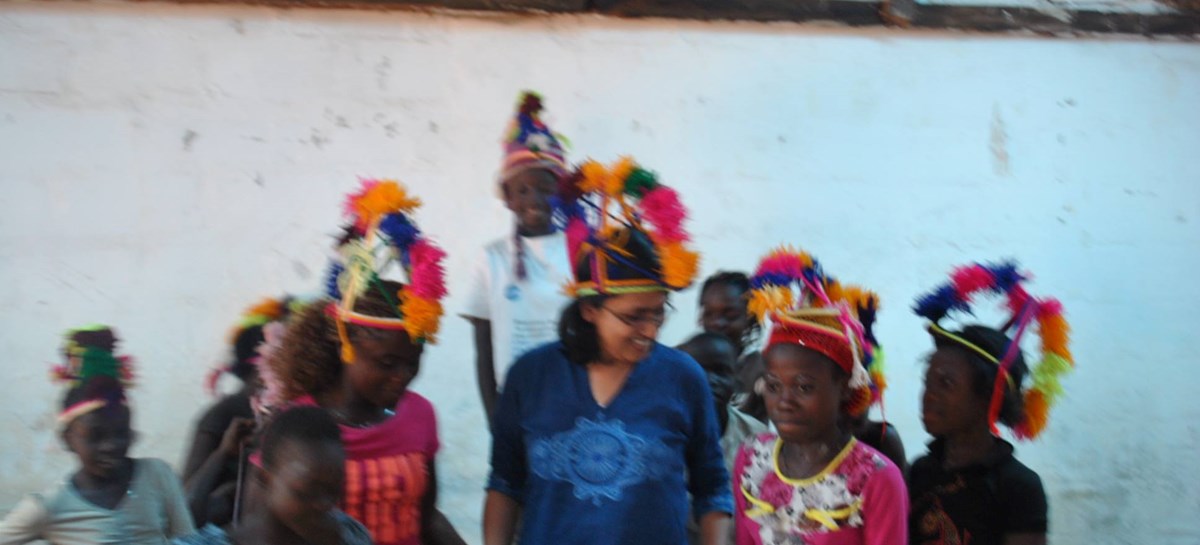
My Journey as a Development Worker
This was the most beautiful welcome I have ever received! Several children from the Ivory Coast performed a dance upon my arrival at the PTP refugee camp in Grand Gedeh county, Liberia in 2014. The traditional costume, face and body painting, wonderfully rhythmic movements with the sound of drums made the atmosphere feel very festive. Their spontaneity created joy, which helped me transcend the confining feeling of being in a refugee camp. I met some of them later on for a discussion to understand their realities, as we were working on education and protection. These children have been living in the camp for almost two years along with thousands of Ivorians who had left the country after ethnic conflicts had started. Meeting resilient children like them has been one of the most enriching experiences of my professional journey.
I have worked with Save the Children in various technical, management and leadership positions in Bangladesh, Papua New Guinea, Liberia, and led efforts to child rights realization. The portfolio covered ending violence against children, ensuring children without families receive appropriate care, protecting children from harmful work, strengthening child protection systems to prevent and respond to violence. My work included implementing programs with children and families in their communities as well as policy and legal advocacy.
Reaching some of the most deprived and marginalized groups of children (e.g. children with disabilities, children from ethnic minority groups, children from untouchable groups) has been rewarding, as I was able to address inter-generational cycle of violence and social discrimination to some extent. Presently I am responsible for leading the global child protection policy and advocacy work of Save the Children.
I have been privileged to interact with children and their families in a range of settings, from remote rural areas to urban slums and refugee camps. I learnt a lot by listening to them, and utilized the learning for national and global level work. How can I ever forget a group of adolescent girls (studying in high school) whom I met in Lalmonirhat district of Bangladesh? Walking for two hours each way to and from school was their usual practice. During rainy season, they had to take a boat to attend classes. Still they did not want to miss the opportunity of accessing education. Most of their classmates have already dropped out due to child marriage and their parents may also arrange marriages for them anytime. That was their biggest anxiety. The girls shared that if they could complete school, they would offer to teach younger students to earn money, and thus it would be possible to attain a college degree. Some of the girls were involved in a child club (facilitated by an NGO), and were creating awareness against child marriage in the community. It has been profoundly inspiriting to note their determination to continue education even when they had to face so many challenges.
In addition to contribution to Child Protection, I have also worked on HIV/AIDS and reproductive health, and conducted research at Centre for International Development (Harvard University), Africa Centre for Health and Population Studies (South Africa), and Institute of Population and Social Research (Mahidol University, Thailand).
The way I view the world has largely been shaped by my work in international development. Living and working in several countries as well as travels for professional reasons gave me nuanced understanding of various cultures and equipped me to deal with complexities. For example, interactions with sex workers, drug users, migrant workers, AIDS affected people in Thailand gave me insights about the lives of the most marginalized groups of society and the importance of protecting human rights while responding to a crisis. I can still remember the vibrant discussions I had with children, parents, community members while working in Papua New Guinea-a country with almost 800 languages and strong traditions. That helped me in realizing that we have to nurture the protective factors of any culture while addressing the harmful practices if we are to create a society that respect the rights of all including women and children.
We live in a world where one billion children globally suffer from violence, which affects their physical and mental health and overall development. This also has serious economic impacts for a country and jeopardizes efforts to achieve Sustainable Development Goals (SDGs). All of us (governments, civil society, international agencies, media, academia, communities, parents, teachers etc.) have to do more and be faster if we want to achieve SDG target 16.2 of ending all violence against children by 2030.
The world is richer than ever before, but inequality is increasing. Economic insecurity, fiscal austerity, migration and violent extremism have contributed to political polarisation and declining trust in institutions. Millions of people are becoming refugees and displaced as a result of wars and conflicts. We have also witnessed a backlash against human rights. Children all over the world are walking out of classrooms to demand that political leaders take actions to protect our collective future. While information technology has revolutionized work, education, communication and entertainment, this has also created challenges for social, political and legal systems.
How can we ensure social justice for all groups of society while progressing economically and leave no one behind? How are we going to define our relationship with our own planet? How will we respond to the new child and human rights concerns due to unprecedented advancement of technology? We need to be courageous to imagine bold and innovative solutions to address the most compelling challenges of our time. I remain committed to creating a sustainable, diverse and just future for all men, women and children.
Laila Khondkar (Bangladesh & University, 1998) is the Head of Advocacy and Policy-Child Protection at Save the Children International.